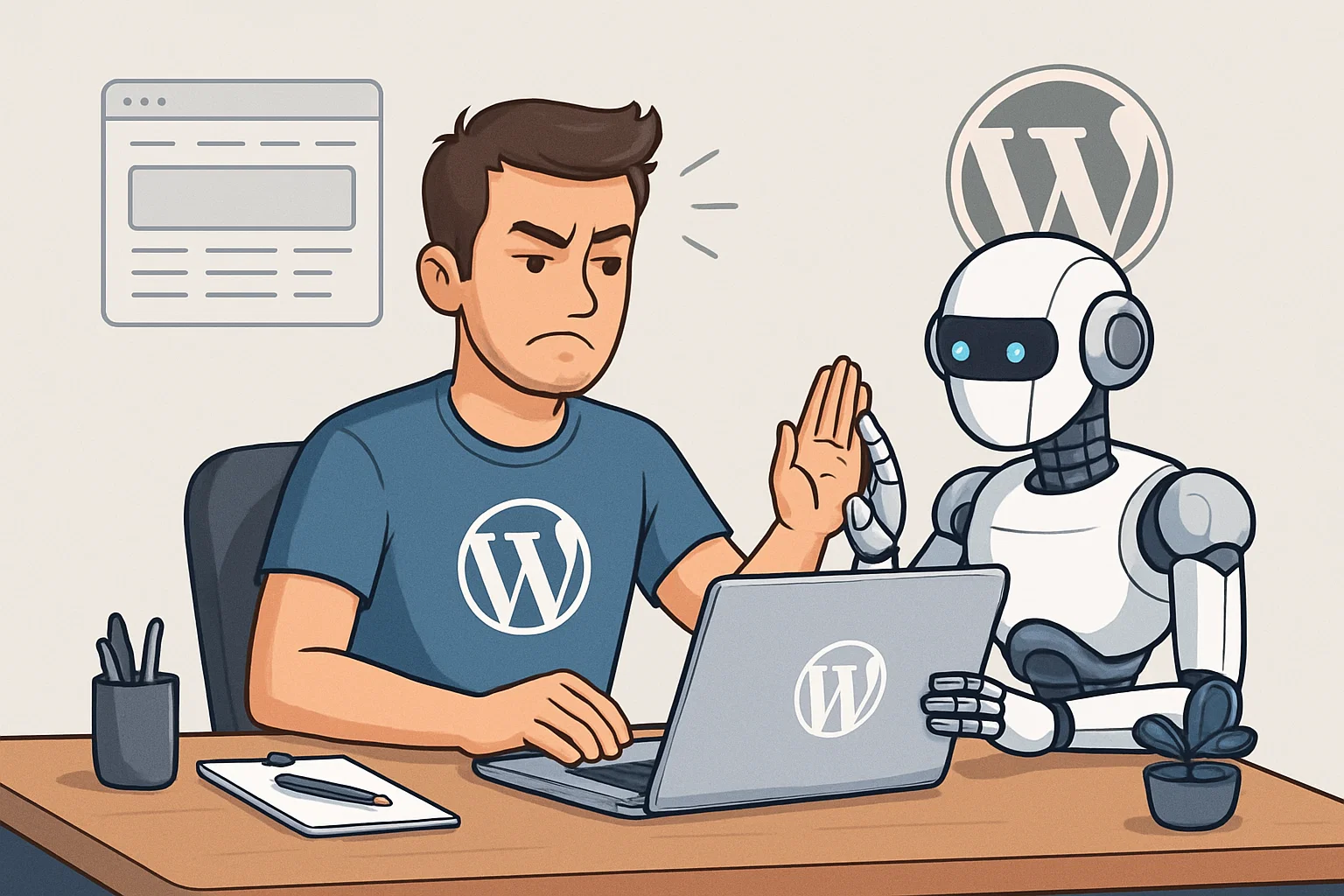
Creating a professional, user-friendly, and visually appealing website is crucial for small businesses in the USA looking to establish a strong online presence. WordPress, being one of the most popular content management systems (CMS), offers a variety of page builders that simplify the website creation process. These drag-and-drop tools allow small business owners, even those with minimal technical expertise, to build stunning websites without writing code. In this comprehensive guide, we’ll explore the most popular WordPress page builders, their pros and cons, and why they’re suitable for small business websites. We’ll also discuss the option of using pre-designed templates and how our experienced team can help bring your vision to life.
Why Use a WordPress Page Builder for Your Small Business?
WordPress page builders are plugins that provide a visual, drag-and-drop interface for designing and customizing websites. They’re especially valuable for small businesses because they:
- Save Time: No coding skills are required, allowing you to create a professional website quickly.
- Reduce Costs: You can design your site without hiring a developer, though professional help can enhance results.
- Offer Flexibility: Page builders provide customizable layouts, widgets, and design options to match your brand.
- Enable Scalability: As your business grows, you can easily update and expand your website.
Below, we’ll dive into the top WordPress page builders, highlighting their features, advantages, and potential drawbacks to help you choose the best one for your small business.
1. Elementor
Overview: Elementor is one of the most popular WordPress page builders, known for its intuitive interface and robust feature set. It offers both a free version and a premium version (Elementor Pro), making it suitable for businesses of all sizes.
Pros
- User-Friendly Interface: Elementor’s drag-and-drop editor is easy to use, even for beginners, with a live preview of changes.
- Extensive Widget Library: Offers a wide range of widgets (e.g., forms, sliders, testimonials) for creating dynamic pages.
- Responsive Design: Built-in tools ensure your website looks great on desktops, tablets, and smartphones.
- Theme Builder: Elementor Pro allows you to design headers, footers, and other theme elements, giving you full control over your site’s appearance.
- Third-Party Integrations: Seamlessly integrates with popular tools like WooCommerce, Mailchimp, and Yoast SEO.
- Large Template Library: Hundreds of pre-designed templates are available, tailored for small businesses such as restaurants, retail, and service providers.
- Active Community and Support: A large user base means plenty of tutorials, forums, and third-party add-ons.
Cons
- Learning Curve for Advanced Features: While the free version is straightforward, mastering Elementor Pro’s advanced features (e.g., theme builder, dynamic content) may take time.
- Performance Concerns: Overusing widgets or poorly optimized templates can slow down your website if not managed properly.
- Premium Costs: Elementor Pro, which unlocks advanced features, starts at $59/year for a single site, which may be a consideration for budget-conscious businesses.
- Plugin Conflicts: Occasionally, Elementor may conflict with other plugins or themes, requiring troubleshooting.
Best For
Small businesses looking for a balance of ease of use, flexibility, and advanced features. Elementor is ideal for service-based businesses, e-commerce stores, and portfolios.
2. Divi
Overview: Divi is both a WordPress theme and a page builder plugin, offering a powerful all-in-one solution for designing small business websites. It’s known for its versatility and elegant design options.
Pros
- Complete Design Control: Divi’s visual builder allows real-time editing with precise control over every element.
- Built-In A/B Testing: Divi includes tools to test different page layouts, helping you optimize for conversions.
- Pre-Designed Layouts: Over 200 layout packs are available, covering industries like retail, consulting, and hospitality.
- Global Styles and Modules: Create reusable styles and modules to maintain consistency across your site.
- WooCommerce Integration: Divi offers specialized modules for building professional e-commerce stores.
- Lifetime License Option: For a one-time fee of $249, you get lifetime access to Divi and all Elegant Themes products, which can be cost-effective for long-term use.
Cons
- Steeper Learning Curve: Divi’s interface can feel overwhelming for beginners due to its extensive options.
- Shortcode Dependency: If you deactivate Divi, your pages may retain shortcodes, making it harder to switch to another builder.
- Performance: Like Elementor, heavy use of modules or animations can impact site speed without proper optimization.
- No Free Version: Divi requires a subscription ($89/year or $249 lifetime), which may not suit businesses seeking free options.
Best For
Small businesses that want a premium, all-in-one solution with advanced design capabilities and are willing to invest in a paid tool.
3. WPBakery Page Builder
Overview: WPBakery Page Builder (formerly Visual Composer) is a veteran in the WordPress page builder space, offering a reliable option for small business websites.
Pros
- Frontend and Backend Editing: Offers both drag-and-drop frontend editing and a backend editor for more technical users.
- Wide Compatibility: Works with most WordPress themes, making it a versatile choice.
- Extensive Add-Ons: A large ecosystem of third-party add-ons enhances functionality (e.g., sliders, galleries).
- Customizable Elements: Provides a variety of content elements like buttons, charts, and accordions.
- Affordable Pricing: A single-site license costs $59 (one-time), which is budget-friendly compared to annual subscriptions.
Cons
- Outdated Interface: The interface feels less modern compared to Elementor or Divi, which may frustrate users accustomed to sleek editors.
- Shortcode Issues: Like Divi, deactivating WPBakery can leave shortcodes in your content, complicating transitions.
- Limited Free Version: The free version (if available) is very basic, and most features require the premium version.
- Slower Updates: WPBakery receives fewer updates compared to competitors, potentially lagging in new features.
Best For
Small businesses with simpler needs or those already using a theme bundled with WPBakery (many premium themes include it).
4. Beaver Builder
Overview: Beaver Builder is a lightweight and developer-friendly page builder designed for speed and simplicity, making it a great choice for small businesses.
Pros
- Fast and Lightweight: Beaver Builder generates clean code, resulting in faster-loading websites compared to heavier builders.
- Simple Interface: The straightforward drag-and-drop editor is beginner-friendly and clutter-free.
- White-Label Option: Ideal for agencies or freelancers creating sites for clients, as it allows branding customization.
- Responsive Design: Built-in tools ensure mobile-friendly layouts.
- Developer-Friendly: Offers hooks and filters for advanced users to extend functionality.
- Reliable Support: Known for excellent customer support and detailed documentation.
Cons
- Limited Design Flexibility: Fewer widgets and design options compared to Elementor or Divi.
- No Free Full Version: The free “Lite” version is very limited, and the premium version starts at $99/year.
- Smaller Template Library: Fewer pre-designed templates compared to competitors, which may require more manual design work.
- Higher Cost for Advanced Features: Features like the theme builder and WooCommerce integration require higher-tier plans ($199/year and up).
Best For
Small businesses prioritizing speed and simplicity over extensive design customization, or those working with developers who need a clean codebase.
5. Brizy
Overview: Brizy is a newer player in the WordPress page builder market, known for its modern interface and focus on ease of use.
Pros
- Intuitive Interface: Brizy’s clean, minimalistic editor is highly user-friendly, even for complete beginners.
- Global Styling: Easily apply consistent fonts, colors, and styles across your site.
- Pre-Made Blocks: Offers a variety of pre-designed blocks for quick page assembly.
- Cloud Hosting Option: Brizy Cloud allows you to host your site on their platform, simplifying setup for non-technical users.
- Free Version: The free version includes enough features to build a basic small business website.
- Affordable Pro Plan: Starts at $49/year, making it a cost-effective option.
Cons
- Smaller Community: As a newer builder, Brizy has a smaller user base, resulting in fewer tutorials and third-party add-ons.
- Limited Advanced Features: Lacks some of the advanced functionality (e.g., dynamic content) offered by Elementor Pro or Divi.
- Fewer Integrations: Not as many integrations with third-party tools compared to competitors.
- Work in Progress: Some features are still being developed, which may limit functionality for complex sites.
Best For
Small businesses with basic website needs, such as landing pages or simple service sites, and those who prefer a modern, streamlined editor.
Using Pre-Designed WordPress Templates
In addition to page builders, small businesses can opt for pre-designed WordPress templates to create a professional website quickly. Templates, often paired with a specific page builder (e.g., Elementor or Divi), provide ready-made designs tailored to industries like retail, restaurants, or consulting. Here’s why templates are a great option:
- Time-Saving: Templates come with pre-built layouts, reducing the time needed to design a site from scratch.
- Professional Design: Many templates are crafted by experienced designers, ensuring a polished look.
- Customizable: Most templates are fully editable with page builders, allowing you to tweak colors, fonts, and content to match your brand.
- Cost-Effective: Templates are often included with page builders or available at low cost (e.g., via marketplaces like ThemeForest).
However, templates may require some customization to stand out, and not all are optimized for performance. Always choose templates from reputable sources and ensure they’re compatible with your chosen page builder.
Which Page Builder Should You Choose?
The best WordPress page builder for your small business depends on your needs, budget, and technical expertise:
- Elementor: Best for businesses seeking a balance of ease, flexibility, and advanced features. Ideal for most small businesses.
- Divi: Perfect for those who want a premium, all-in-one solution with extensive design options.
- WPBakery: Suitable for businesses using themes that include it or those with simpler design needs.
- Beaver Builder: Great for speed-focused sites or businesses working with developers.
- Brizy: Ideal for startups or businesses with basic needs and a limited budget.
To ensure optimal performance, always pair your page builder with a lightweight, compatible theme, optimize images, and use a caching plugin like WP Rocket or W3 Total Cache.
Let Us Build Your Dream Website
At our company, we understand that creating a website can feel overwhelming, even with the best page builders. That’s where our expertise comes in. With years of experience crafting WordPress websites for small businesses across the USA, we specialize in using Elementor, Divi, WPBakery, Beaver Builder, and Brizy to deliver stunning, high-performing websites tailored to your needs. Whether you want a custom-built site or a template-based solution, our team is here to bring your vision to life.
Contact us today to discuss your project, and let us help you create a website that drives results for your small business!



